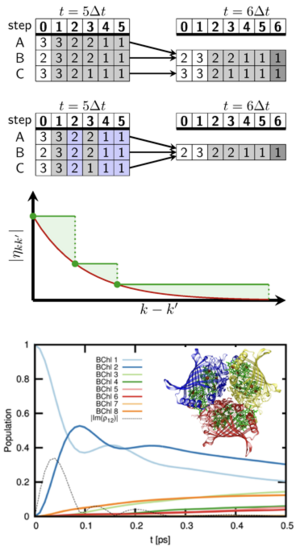Efficient Path Integral Dynamics
Systems, where a fully atomistic treatment is not feasible, can be modelled as dissipative quantum systems coupled to their environment. Time-dependent properties and observables such as spectra can then be obtained from the evolution of the reduced density matrix. A versatile method for the time-dependent simulation of such systems is the QUasi-Adiabatic Path Integral (QUAPI) approach. We have developed a powerful parallel implementation of QUAPI, including methodological advances that allow to speed up simulations by several orders of magnitude. This is achieved by Mask Assisted Coarse Graining of the Influence Coefficients (MACGIC-QUAPI) [J. Chem. Phys. 146, 214101 (2017)] and inclusion of low scaling sorting and merging algorithms in on-the-fly path selection.
The MACGIC-QUAPI method successfully interpolates between the weak- and stron-coupling regimes of excitation energy and electron transfer. It can be applied to large systems, demonstrated for a fully coupled 24-state model of the Fenna-Mathews-Olsen complex. Convergence to numerical exact result was confirmed by comparison to high-level hierarchical equations of motion simulations. Furthermore, the algorithmic structure allows for efficient parallelization on modern high-performance computing hardware.
